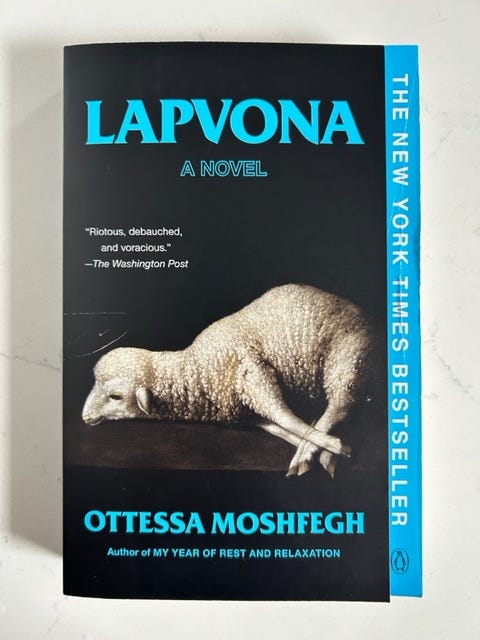'Carmilla' by Joseph Sheridan Le Fanu
'You must come with me, loving me, to death; or else hate me and still come with me, hating me through death and after.'—Review #219

Roughly a year ago, after I told you about ‘Dracula’ and his idiotic real-estate decisions, a reader reached out to recommend another vampire novel, ‘Carmilla’ by Joseph Sheridan Le Fanu. Specifically, the edition edited and with an introduction by author Carmen Maria Machado. I hadn’t heard of the book, but I like Machado’s work, and I take reader recommendations seriously. At the approach of Halloween, I ordered a copy.
Here’s the cover:

‘Carmilla,’ about a tense relationship between two women, is regarded as an inspiration to Bram Stoker and is a warning about why you should never let randos crash at your place. Laura, the narrator, is a young woman who lives in an Austrian castle with her father and two governesses in the mid-1800s. Years prior to the events of the novel, she experienced a traumatic childhood incident where a beautiful woman appeared in her room, climbed into bed with her and bit her as she slept. Laura screamed, startling the strange woman, who then slid under the bed and disappeared. Can you imagine? I’d never sleep again, like:
Laura, now a young adult, is lonely and yearns for friends her own age. One potential friend, the niece of a general who lives nearby, was due to visit, but has recently come down with a mysterious illness. Then, one day, when Laura and her father are out for a walk, a horse-drawn carriage thunders by and gets into an accident. A young woman, who appears to have been stunned in the crash, is pulled from the carriage as footmen set it right. The woman’s mother, a Morticia Addams type, tells Laura’s father that she is in haste and her journey cannot be delayed waiting for her daughter to recover, so she leaves her in his care. Laura is delighted at the prospect of becoming friends with the convalescent woman named Carmilla, but when she finally gets a good look at her, she’s shocked to realize it’s the same woman she saw in her room years ago. Laura confronts Carmilla, but she does a Jedi mind trick on her like:
During her stay, Carmilla displays the traits of a Gen-X icon: Not only does she have a single parent who is perfectly fine leaving her with strangers, but she also goes out all night, sleeps beyond noon, slacks off during the day, wears all black (as shown in the illustrations that accompany the text), is oddly wistful about parties that happened decades ago, and is disdainful of other people’s musical tastes (especially when it comes to funeral dirges). Laura and her guest become close; she enjoys braiding Carmilla’s lustrous hair while Carmilla seems bent on seducing Laura with kisses and creepy professions of love, as you’ll read below. Laura tries to resist, thinking Carmilla’s advances are bizarre and embarrassing. But in one encounter, she experiences an orgasm, thinly disguised by Le Fanu but pointed out by Machado in a footnote and in the introduction. (It’s an unusual inclusion for the Victorian era, apparently.) Eventually, Laura learns that other young women in the area are contracting the mystery illness that felled the general’s niece. They weaken, as if their life force is being drained, and then die. A rumor starts that there’s a vampire running around. Laura herself starts to fall ill and dreams she’s being attacked by a cat. She startles awake to find Carmilla in her room slowly backing away and disappearing like:

She realizes her new best friend is a:

As vampire hunters get organized to destroy Carmilla by driving a stake through her and then beheading her, we learn more about her powers. Not only does she have the ability to disappear, but she has heightened strength and agility that allows her to disarm with one hand an axe-wielding antagonist. She also doesn’t age, despite being more than a century old, and she maintains her youthful appearance through a bizarre bathing and skin-care routine, like:

‘Carmilla’ would have been a creepy delight all on its own, but the introduction by Machado makes it even better. She offers a fascinating analysis of the story, drawing out the lesbian undertones of the Victorian-era narrative and providing fascinating background details about the real-life women on whom Le Fanu apparently based his story. I’m still trying to get my head around it: He somehow saw the makings of a horror story in letters one of them wrote about their secret love. I’m like:

What I’ve been thinking about since I finished the book is Machado’s insights into Carmilla’s loneliness. In other stories, vampires are depicted as lustful predators whose only aim is the living blood of their prey. Carmilla seems to feel a genuine need to love and be loved by the women she destroys. Machado also suggests the character seeks something like consent from her partners in their ruin. She’s still a monster, of course, but she’s somewhat conflicted about what she is, and that makes her more interesting to me than other vampires like, say, Dracula. I can’t stop thinking about how Carmilla’s manifestation of love only succeeds in dooming her to an existence of unending loneliness. If you’re looking for a good Halloween read, you should follow our reader’s suggestion and check out this edition of this book.
An excerpt:
This passage is more interesting than how it begins.
I now write, after an interval of more than ten years, with a trembling hand, and with a confused and horrible recollection of certain occurrences and situations in the ordeal through which I was unconsciously passing, though with a vivid and very sharp remembrance of the main current of my story. But, I suspect, in all lives there are certain emotional scenes—those in which our passions have been most wildly and terribly roused—that are above all others the most vaguely and dimly remembered.
Sometimes after an hour of apathy, my strange and beautiful companion would take my hand and hold it with a fond pressure, renewed again and again—blushing softly, gazing in my face with languid and burning eyes, and breathing so fast that her dress rose and fell with the tumultuous respiration. It was like the ardor of a lover; it embarrassed me; it was hateful and yet overpowering; and with gloating eyes she drew me to her. Her hot lips traveled along my cheek in kisses; and she would whisper, almost in sobs, “You are mine, you shall be mine, you and I are one forever.” Then she would throw herself back in her chair with her small hands over her eyes, leaving me trembling.
“Are we related?” I used to ask. “What can you mean by all this? I remind you perhaps of someone whom you love; but you must not, I hate it; I don’t know you—I don’t know myself when you look so and talk so.”
She sighed at my vehemence, then turned away and dropped my hand.
My rating:

‘Carmilla’ by Joseph Sheridan Le Fanu was originally published in 1871. The edition edited and with an introduction by Carmen Maria Machado was published by Lanternfish Press in 2019. 139 pages. $15.81 at Bookshop.org.
Recent pickups:
I’ve seen other newsletter writers show the books they’ve recently acquired, so I figured I’d do it, too. Here are my recent purchases and where I found them:
Top row, from the left:
‘Labyrinths’ by Jorges Luis Borges (Lofty Pigeon Books)
‘The Caretaker’ by Doon Arbus (Three Lives & Company)
‘Café Purgatorio’ by Frederick Mark Kramer (Brooklyn Book Festival)
Second row:
‘The Game’ by A.S. Byatt (Strand Book Store)
‘Tell My Horse: Voodoo and Life in Haiti and Jamaica’ by Zora Neale Hurston (Womb House Books)
‘The Actual Star’ by Monica Byrne (Lofty Pigeon Books)
Books on GIF does not solicit review copies. We feature books we purchase at independent bookstores around New York City or on our travels, or were borrowed electronically from the Brooklyn Public Library. Want me to review one of these? Let me know in the comments.
What’s next:
Before you go:
ICYMI: Review #218
Read this: A new-to-me newsletter that I’m obsessed with is
. I’m not a big car guy, but I love reading stories about people who are really into specific things. This newsletter does that and more: It also features driving-song playlists and great pictures of New York. Check it out:Thanks for the shoutout: Special thanks to
for featuring Books on GIF in her recent newsletter roundup!If you enjoyed this review:
Thanks for reading, and thanks especially to Donna for editing this newsletter!
Until next time,

MPV













The Olivia Rodrigo gif took me out 😂
Another stellar review of a classic!
Omg, I can't wait to read your review of Lapvona. I couldn't with that book.